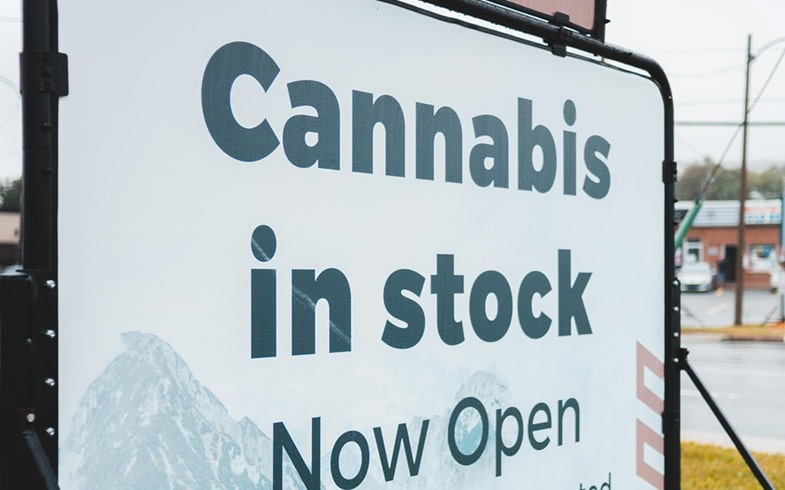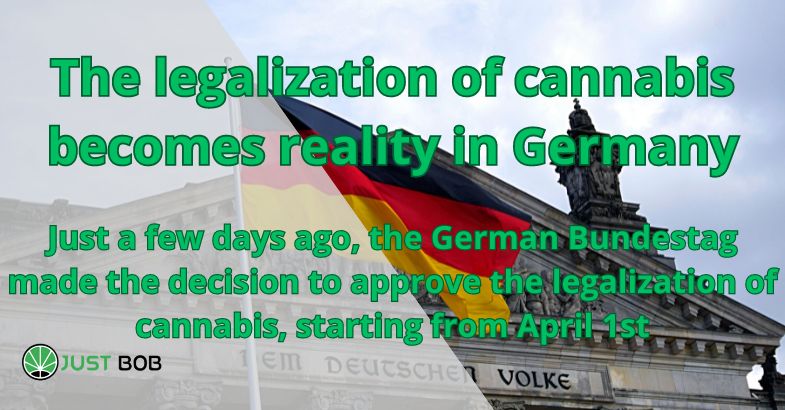Published on: 28/02/2024
Just a few days ago, the German Bundestag made the decision to approve the legalization of cannabis, starting from April 1st. Meanwhile, questions arise about the implications of this imminent epochal change.
In recent years, the debate on cannabis legalization has been prominent in many parts of the world. However, the real breakthrough came a few days ago, on Friday, February 23, 2024, when Germany took a significant step in this direction, with cannabis legalization set to officially take effect on April 1, 2024.
Cannabis legalisation Germany: A Change in Perspective
The new law, approved by the German coalition government led by Chancellor Olaf Scholz, received 407 in favor and only 226 against (with 4 abstentions) and this clearly reflects a change in perspective and approach towards the substance. While in the past, cannabis was primarily seen as an illegal drug, society is increasingly recognizing the numerous therapeutic benefits (in case of chronic disease or pain, for example) associated with the use of medical cannabis (or medicinal cannabis), leading to a reduction in its demonization.
The growing awareness of the social and economic impacts related to the production and consumption of cannabis has led to a reconsideration of existing policies. Germany’s recent decision to legalise cannabis is intrinsically linked to the desire to educate society and reduce the black market associated with its consumption, a matter particularly close to the heart of the Social Democrat Karl Lauterbach, the German health minister, who expressed his views during a debate in the federal government in Berlin.


The new German law aims to provide a regulatory framework that not only governs the production, sale, and consumption of cannabis but also seeks to educate the population about the substance’s effects and promote responsible usage. The key strategy is to shift control from the illegal market to state regulation, ensuring safety and quality standards.
Furthermore, legalization is viewed as a tool to reduce the influence of the black market by cutting funding to criminal organizations involved in drug trafficking. The goal is to promote a more balanced and informed approach to cannabis, encouraging awareness and preventing the risks associated with uncontrolled use. This new perspective reflects a modern trend that seeks to address drug-related challenges through education, prevention, and responsible regulation.
Read also: 5 remedies for neck pain (some of which you probably hadn’t considered)
Cannabis plants and cannabis clubs: what does the regulation of cannabis possession entail?
From April 1, 2024, regulated cannabis supply for adults will be legal. Individuals will be allowed to possess up to 50 grams at home, while in public, carrying up to 25 grams (enough for 75 joints) will be permitted (private consumption). For personal cultivation, up to three plants will be allowed within one’s domestic premises.
As for the so-called “Cannabis social Clubs,” whose foundation will be allowed from April 1, 2024, members can collectively cultivate cannabis plants and share the harvest.
However, regarding the maximum levels of THC allowed, it is still unclear what the limit should be. Currently, the maximum THC limit is one nanogram per milliliter of blood, but an expert committee is still investigating to determine the ultimate limit.
Moreover, the law prohibits citizens from smoking within 100 meters of schools, kindergartens, playgrounds, and sports fields. The same prohibition applies in pedestrian zones between 7:00 a.m. and 8.00 p.m.
Divergent reactions in Society
Germany’s decision to legalize marijuana is not without criticism from a segment of German society. While many see this move as a step forward towards more modern and pragmatic drug policies, there is a fraction of the population expressing concerns and opposition.
Some critics fear that legalization could lead to an increase in cannabis consumption, especially among young people, with potential consequences for public health. Others raise concerns about road safety, arguing that the presence of THC, the active ingredient in cannabis, in drivers could increase the risks of traffic accidents (although a study conducted in Canada shows that cannabis use while driving did not increase the rate of road accidents). Additionally, there are voices emphasizing the uncertainty and lack of long-term data on the social and economic impacts of legalization.
These criticisms highlight the complexity of balancing individual freedom and social responsibility in the context of significant changes in drug policies, to the extent that, in addition to the population, some ministers from the regions of Schleswig-Holstein, Hamburg, and Lower Saxony express doubts about the decision to legalize cannabis.
Read also: Diseases Treatable with Cannabinoids: A Comprehensive Analysis of the Potential of These Compounds


Implications for the CBD cannabis Market
The legalization of cannabis in Germany could have significant repercussions on the CBD cannabis market. Firstly, it is likely that interest and demand for light hemp products, such as CBD weed, CBD oil, and CBD in other formats, will increase, as legalization can contribute to destigmatizing the entire hemp product category and their use. Facilitated and regulated access could encourage more consumers to explore light hemp options, increasing its popularity.
However, increased competition resulting from legalization could put pressure on some light hemp producers and distributors, even trusted ones like Justbob. With wider availability of recreational cannabis, consumers may prefer products with higher THC levels, shifting attention away from light hemp. This could require a strategic adaptation from light hemp producers to maintain their relevance in the market.
At the same time, legalization could open up new opportunities for innovation in light hemp production, with the potential to develop more sophisticated and high-quality products that meet the needs of an increasingly aware customer base.
In short, the repercussions can vary, involving both challenges and opportunities for the light hemp sector in Germany following cannabis legalization.
Conclusions
In conclusion, as Germany takes the historic step of legalizing smoking marijuana (and using cannabis), effective from April 1st, a myriad of questions and considerations emerge regarding the impact of this transformative decision. The recent approval by the German Bundestag signals a seismic shift in the nation’s approach to cannabis, transitioning from viewing it primarily as an illicit drug to recognizing its potential for medical and recreational use.
The new law encompasses various facets, including regulated possession, private cultivation, and controlled distribution, underlining a comprehensive effort to regulate cannabis-related activities. While the decision reflects a modern perspective and aligns with evolving global attitudes towards cannabis, it also sparks discussions about potential health, societal, and economic implications. The involvement of figures such as Health Minister Karl Lauterbach underscores the government’s commitment to navigating the balance between individual freedoms and public welfare.
As Germany leads the way, observers and policymakers alike will closely monitor the unfolding effects on drug legislation, societal attitudes, and the broader European landscape, considering factors such as cannabis possession, medical use, and recreational practices.
The journey ahead will undoubtedly involve ongoing dialogue, adjustments, and the careful observation of how other EU countries may choose to follow suit in the evolving cannabis landscape.









